Au Hasard Balthazar
Here’s the idea behind “A Canadian, an American, a Lawyer, and an Elitist”: Rhett’s favorite movie is Meatballs 4, Shawn has an unhealthy fixation on Resident Evil, Richard scoffs at anything that isn’t pretentious and hoity toity, and Adam is a prick who hates everything. We all watch far too many movies, and spend our time analyzing them. So we each watch the same movie, write our analysis of them, and then go to a chat room to discuss it, unaware of what the others have written. A warning: if you haven’t seen the film we are discussing, it may not be best to read this article, because it is spoiler heavy.
Keep in mind that when we watched and analyzed the film in early 2005, it was extremely hard to find. There was no Criterion edition or any other version that would be easy for an American to find.
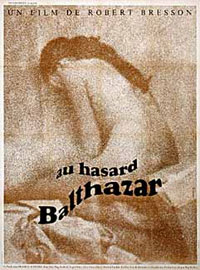 Analysis by a Canadian: Rhett Miller
Analysis by a Canadian: Rhett Miller
Robert Bresson’s world is one of minimalism. Lighting is naturalistic, acting is blank, and scenes run usually under a minute. Similar to Bertolt Brecht, he did not believe in sweeping the audience up in romanticization of narrative. It has become our inclination to passively allow the stage or cinema to can our feelings for us, to instruct us what, when and how to feel. But in presenting an alienated style of wooden acting, both Brecht and Bresson both sought to do away with this kind of emotional manipulation, instead making the actors an empty vessel for the audience to instead create emotion. The actors read lines, the audience interprets them. In Au Hasard Balthazar, Bresson goes a minimalist step further in truncating his entire story. Scenes never connect; for every minute of screen time, there seems like another five that has been skipped over. This kind of narrative structure makes the story tough to follow, and often becomes a hindrance in deciphering the mélange of metaphors present throughout.
What the disjointed narrative structure also does though, is force the audience to surrender emotion and instead become the objective observer. The natural inclination when watching a film about the life of a donkey would be to sentimentalize the main character. Like an Air Bud or Benji, such a film generally forces the audience to feel compassion and understanding for the titular character. That is the easy route. In Balthazar, the film is less about the cute triumphs of the animal lead, but instead about more cerebral topics, like faith, capitalism and suffering. Therefore, in utilizing abrupt transitions throughout, Bresson prevents the audience from becoming swept up in emotion or narrative, forcing instead the audience to consider Balthazar and the other characters in an objective manner. What this does is essentially place the audience in an enlightened state of mind. Without emotions to cloud our viewing of story, we are allowed to therefore use our mind. We, the audience, therefore become God, judging these characters as they suffer through the aimless and helpless struggles of life.
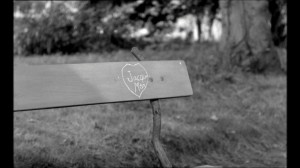 Although Balthazar is the main character in the film, we are given a window into the lives of many more. We view the ironies of the world, like the fact that the town drunk, despite all his other failures, ends up becoming Balthazar’s most respectful owner, while conversely the respected priest sins the greatest by promising out spiritual forgiveness in return for personal favors. We observe how capitalism has become the new religion, driving the goals of many of the characters. When asked what he believes in, one of Balthazar’s many owners simplistically states “I believe in what I own.” The allure of commodity and personal self-gain drives most of the characters to live under a similar dictum. The flat and empty performances are definitely a way for Bresson to distance the audience from his characters, but the flat performances also shed light onto Bresson’s perceptions about our capitalistic state. In the pursuit of money over love, the characters in the film are empty. Two children promise themselves they will marry later in the film, but as they become fully integrated into the hegemony of capitalism, they turn their backs on such passion. Capitalism forces one to look out for themselves, and marriage is counter-productive to that singular goal. What is love when fields are to be harvested, bread to be sold and money is to be made?
Although Balthazar is the main character in the film, we are given a window into the lives of many more. We view the ironies of the world, like the fact that the town drunk, despite all his other failures, ends up becoming Balthazar’s most respectful owner, while conversely the respected priest sins the greatest by promising out spiritual forgiveness in return for personal favors. We observe how capitalism has become the new religion, driving the goals of many of the characters. When asked what he believes in, one of Balthazar’s many owners simplistically states “I believe in what I own.” The allure of commodity and personal self-gain drives most of the characters to live under a similar dictum. The flat and empty performances are definitely a way for Bresson to distance the audience from his characters, but the flat performances also shed light onto Bresson’s perceptions about our capitalistic state. In the pursuit of money over love, the characters in the film are empty. Two children promise themselves they will marry later in the film, but as they become fully integrated into the hegemony of capitalism, they turn their backs on such passion. Capitalism forces one to look out for themselves, and marriage is counter-productive to that singular goal. What is love when fields are to be harvested, bread to be sold and money is to be made?
In allowing the viewer to partake in objectively observing the lives of the various townsfolk throughout the middle portions of the film, Bresson gives us a context in which to view Balthazar. He has become the ultimate pawn for the capitalistic cruelty of society. “We are born free, but everywhere we are in chains,” and after being born in a manger amongst other livestock, Balthazar is forced to become servant to many. He starts hauling hay, then moves to bread, and in his most exploited moments, he becomes a circus act. He acts like the perfect Bressonian character, simply observing, never reacting. All the while, we too, in our God-like audience position, sit there viewing Balthazar as he passes through various stages of suffering throughout his life. He is beaten, whipped, starved and ultimately shot, but throughout Bresson never forces on staged sympathy. We just simply observe.
When Balthazar finally dies at the end of the film, we grant him our blessings. Bresson achieves this judgment not by making us love him through heartfelt close-ups or cute reaction shots. Instead, as enlightened observers, we respect the life he has lived, and the fact that this meek animal has accepted his place in life and lived within his means. Bresson, being a man of the Holy book, seemed to believe that as long as we did as we lived a life of submission and devotion, that we would be rewarded in the afterlife. His Balthazar, with his quiet acceptance of the fate that he has been dealt, therefore becomes the ultimate pilgrim. After viewing his life from above, we know that in the next life, Balthazar will be better fated. When he ultimately lies down his final time among sheep, we know that he has deserved his rest. We don’t cry, but we give him our blessings, and that is just what Bresson would want us to do.
I admit that I had reservations before watching this film, and put it off for nearly a week. The film, being black and white with subtitles, may instantly turn off average filmgoers. Obviously, these types of things have to effect or deterrence on people like the other reviewers and me. My problem, as silly as it may seem, is that it is about a donkey. As much as one could use the difficulty in obtaining this film as an excuse for not having seen it, the bottom line is I would not have watched this if it were available in America. It is about a donkey, and as versed in film as I feel I have become, I have come to realize that I still do have some prejudices. I am very thankful for this being selected, because otherwise I may not have ever watched it. My initial thought after reading a plot synopsis was, “A donkey can’t keep me engaged for an hour and a half.” Perhaps this was based off of seeing animal centralized Hollywood films such as Homeward Bound and The Adventures of Milo and Otis. In these movies animals are either given human voices or involved in simple-minded scenarios and silly situations, meant for the audience to “ooh-and-ahh” over. I assumed that a film based upon an animal’s life couldn’t be dramatic. That’s what I get for ASSuming. I was more an ass then Balthazar.
Analysis by an American: Shawn McLoughlin
This is the first Bresson film I have seen, but it certainly won’t be the last, this sadly means that I can not compare it to his other films. It seems as though the atmosphere was stagnant throughout every scene. It shares a constant, unchanging mood. This feeling is shared, or even influenced, by the actors who are mostly stone faced through whatever happens to them. Marie’s character, one of the few characters who had a true love of Balthazar, looked emotionless in both sequences where she would show care for her donkey and while she watched it being beaten. Gerard would look the same when beating the donkey, and when he was attempting to rape Marie. By dehumanizing the characters, even the more humanitarian of them, the viewer finds it easier to relate to Balthazar. He becomes more human then his co-stars. It certainly doesn’t help that the human characters aren’t developed, and they seem to simply “exist” as they are. It fits though, as in our own lives, there are plenty of people who we perceive that do the same.
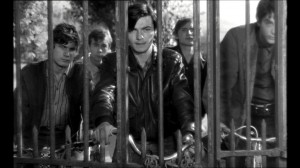 As engaging as the film was, at times I found it difficult to watch. Violence towards animals disturbs me, and with this film being released in 1966, I find it difficult that it would have met with PETA’s approval today. One scene, involving a paper being tied to Balthazar’s tail and then set on fire, particularly made me cringe. I doubt that it was faked, and combined with other sequences of brutality from Gerard and his delinquent friends towards the donkey made me disgusted. But, sadly, that’s life. This film forced me to look at what disgusts me about life, whereas I would normally just look away. So the wanton violence has purpose, and it serves it well.
As engaging as the film was, at times I found it difficult to watch. Violence towards animals disturbs me, and with this film being released in 1966, I find it difficult that it would have met with PETA’s approval today. One scene, involving a paper being tied to Balthazar’s tail and then set on fire, particularly made me cringe. I doubt that it was faked, and combined with other sequences of brutality from Gerard and his delinquent friends towards the donkey made me disgusted. But, sadly, that’s life. This film forced me to look at what disgusts me about life, whereas I would normally just look away. So the wanton violence has purpose, and it serves it well.
One of the characters compares him to a saint. I am not a Christian, but I can understand the association. Like a true canonized saint, Balthazar lives his life entirely to help others, and in their servitude. Even for those who used him for inappropriate means was still given some reward as a result. Marie and later the baker’s wife were given a companion, Gerard was indirectly given a radio for work the donkey helped him do. As a true Saint, he offered his life in devotion and servitude for those in need, whether they realized it or not.
I read that Godard called the film “life in ninety minutes.” I feel that is a pretty accurate statement. Life is filled with pain and sorrow and very few moments of serenity. Balthazar’s life is no different. Balthazar becomes a victim to the world, to be abused and loved at its whim. There is a docile feeling to the donkey that may be misconstrued as a weakness. In actuality, I perceive it to be that Balthazar takes everything that happens in his life as it comes, because he sees himself as above the bitterness that humans show him. Even those that he felt love from at points were not unconditional in their offering of it. At the end, he found solace in a field surrounded by grazing sheep, a place where he felt comfortable. He was neither the center of attention or emotion to this herd, but he was able to find comfort with others that did not wish to use him for personal means. His final audience allows him to stay with no ill feelings towards him and no desire from him. They allow him what is probably the one true moment of bliss in the entirety of his life, which we are privileged to see. We should all be so lucky when it is time to meet our fates.
Analysis by a lawyer: Richard Stracke
I approached Au Hasard Balthazar with trepidation. It was a holy grail- praised to the heavens, generally unavailable, a film like no other. In short, my expectations were higher than fanboys on the eve of The Phantom Menace. Even the most pedestrian filmgoers will tell you how painful it is to have your hopes dashed. Having previously seen six of Bresson’s films, I knew that the film would be worth watching, but would it come close to meeting my lofty expectations? As I soon discovered, it did more than meet them. It surpassed them
I may as well warn you now, I feel uncomfortable attempting to dissect the film. It’s not that I feel that the task is above me. I’m afraid that strict scrutiny will wipe away some of the magic.
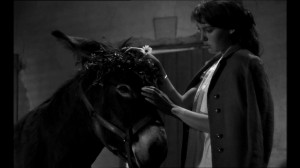 “Balthazar’s cuts and ambiguities give his work a mysterious grace that few films possess. It requires an astute viewer. He never goes out of his way to explain causal relationships or even to give us someone to identify with. His cinema is the polar opposite of standard melodrama. The plot would be ripe for such treatment. It features a charming setting, a mysterious crime, a ‘lost’ girl, generational and class conflicts, unrequited love and an animal as its central figure. I would be more than willing to watch such a soap opera, but fortunately Bresson has created something exceptional. It has been said that he distills the cinema to its essence. Like Bunuel, he rarely tells us how to feel or who to identify with. I don’t mind being manipulated, but unless the director takes it bewildering extremes (Moodyson in Lilya 4-Ever or Von Trier in his Golden Heart films) I won’t take the bait. For me, as a generally detached viewer, this style works perfectly. It is liberating to be able to draw my own conclusions.
“Balthazar’s cuts and ambiguities give his work a mysterious grace that few films possess. It requires an astute viewer. He never goes out of his way to explain causal relationships or even to give us someone to identify with. His cinema is the polar opposite of standard melodrama. The plot would be ripe for such treatment. It features a charming setting, a mysterious crime, a ‘lost’ girl, generational and class conflicts, unrequited love and an animal as its central figure. I would be more than willing to watch such a soap opera, but fortunately Bresson has created something exceptional. It has been said that he distills the cinema to its essence. Like Bunuel, he rarely tells us how to feel or who to identify with. I don’t mind being manipulated, but unless the director takes it bewildering extremes (Moodyson in Lilya 4-Ever or Von Trier in his Golden Heart films) I won’t take the bait. For me, as a generally detached viewer, this style works perfectly. It is liberating to be able to draw my own conclusions.
In a single shot, Bresson says what a less audacious director could spend an entire scene drawing out. A prominent example is the iconic shot of Marie huddled against the wall. He could have shown us more, but such gratuity was unnecessary. As is frequently the case with horror films, what isn’t shown is infinitely more horrifying than most on screen brutality could ever hope to be. Another similar example follows the scene with Marie and Gerard’s encounter in the car. The shot of his filthy working man’s hands slithering around her then chaste body followed moments later by the tooting of his horn encapsulate remain with me.
There are a number of ambiguities that I hope to address in the chat. Although some appear inexplicable, I don’t believe that they detract from the film or its power, but I’m not sure what to make of them:
1. Is there a central character?
If I had to choose, I would say Balthazar. It is never entirely from his perspective, but he, as the victim of countless traumas and observer of even more, is certainly the major figure. If the film is about sainthood and such, he is the only one who never falls.
Although I don’t agree, I could argue that Gerard is the star. As destructive as he is, he’s the only one who is consistently assertive. Whether he is planning petty crimes, manipulating Maria or abusing Balthazar, he is at least a peripheral player in almost every key event.
2. Why are the characters so passive?
This comes into play with almost everyone except for Gerard. Marie remains loyal despite the fact that he has nothing to offer apart from abuse. Her mother hides the fact that he may be stealing money. Father’s name is ruined because he is so unassertive. Many of them have opportunities for happiness. Marie could have had a comfortable life with her childhood friend. Instead, she allows herself to be manipulated by Gerard. When questioned about the logic, even she cannot explain their ‘love’.
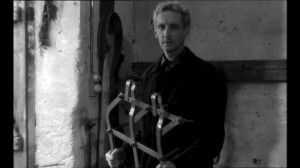 Have they been so mistreated that they, like Balthazar, simply accept that they are pawns to their masters- fate, their antiquated places in the modern world
Have they been so mistreated that they, like Balthazar, simply accept that they are pawns to their masters- fate, their antiquated places in the modern world
3. The use of music
Music is largely absent from Bresson’s earlier films. Here, apart from the Schubert, it remains diagetic (mainly Gerard’s handheld radio). In most cases, I’m an advocate of the Scorsese/PT Anderson school of stuffing a film with as many songs as possible, but in Balthazar’s case, the infrequency makes the music especially poignant. Although I’m largely unaware of the songs and artists, I love the sound of 60s French pop. Hearing more of it in such a memorable film was an unexpected treat.
4. Balthazar’s Death
Even in the final haunting moments, Bresson teases us with ambiguity. I knew two things. One: there was a close up of a wound. Two: Balthazar died a few shots later. Was this wound the result of Gerard’s gang and their beatings? The result of a stray bullet? An unseen injury suffered in the forest? Even more puzzling, was it cause of death or simply a coincidental red herring? I’m not sure that a definitive answer can be reached.
It may be my unquestionable adoration of animals or maybe I’m too easily taken by allegorical imagery, but the final sequence is one of the most moving that I’ve seen. I knew of it before watching the film, but that didn’t reduce it tug on my heartstrings. To be honest, I’m not even sure what it symbolizes. Is it a Christian metaphor, haunting pastoral tableau or merely the last resting place of a common beast of burden? Whatever your interpretation, it seems the perfect ending for a film that is not only one of the most unique in cinematic history, but one of the most rewarding.
Analysis by an elitist: Adam Lippe
The line between fascinatingly obscure and elliptical and maddeningly vague and frustrating is a thin one. While a viewer can have their interest piqued by the suggestion or implication of events, they can also be turned off if they are never given enough information and the confusion takes them out of the film. Robert Bresson’s Au Hasard Balthazar is an odd case, because while there are many things, seemingly large plot points, that are never made clear, the film is told from the perspective of a donkey, who wasn’t witness to the major events in other people’s lives, only his own.
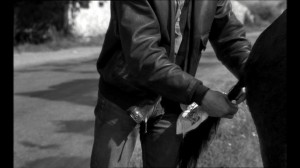 However, Bresson is not faithful to that construct; we see things that take place at a police station, outside a courthouse, and a myriad of other locations where Balthazar was not present. On occasion, the choice to be suggestive is quite effective. Marie’s deflowering at the hand of Gerard appears as if she has been chased and chased and regrettably given up. It perfectly represents the feeling that permeates a lot of Victorian era films/books, where the woman remains chaste until her aggressor simply won’t relent, resulting in what verges on rape. Maybe she gets pregnant and is deemed a slut, or she is forced to marry the guy, despite it not being her own decision. But Marie doesn’t get pregnant, nor does she marry Gerard, though she seemed to have entered a sort of brainwashed slavery, where she consciously chooses to be miserable. Even when she tries to defend the drunk, Arnold, she gets slapped twice for even getting in the way and forgives Gerard for no particular reason. This continues after she gets away from Gerard, specifically in the scene where she sneaks onto the rich owner’s property and offers herself sexually, almost as an implication that since, as she says later, he is old and ugly, he can only get someone as low and burned out as her. Her further debasement is evident when she returns his pity offer of money and sleeps with him anyway, because he offered her food and shelter for the night.
However, Bresson is not faithful to that construct; we see things that take place at a police station, outside a courthouse, and a myriad of other locations where Balthazar was not present. On occasion, the choice to be suggestive is quite effective. Marie’s deflowering at the hand of Gerard appears as if she has been chased and chased and regrettably given up. It perfectly represents the feeling that permeates a lot of Victorian era films/books, where the woman remains chaste until her aggressor simply won’t relent, resulting in what verges on rape. Maybe she gets pregnant and is deemed a slut, or she is forced to marry the guy, despite it not being her own decision. But Marie doesn’t get pregnant, nor does she marry Gerard, though she seemed to have entered a sort of brainwashed slavery, where she consciously chooses to be miserable. Even when she tries to defend the drunk, Arnold, she gets slapped twice for even getting in the way and forgives Gerard for no particular reason. This continues after she gets away from Gerard, specifically in the scene where she sneaks onto the rich owner’s property and offers herself sexually, almost as an implication that since, as she says later, he is old and ugly, he can only get someone as low and burned out as her. Her further debasement is evident when she returns his pity offer of money and sleeps with him anyway, because he offered her food and shelter for the night.
This ties into Bresson’s view of the world and his treatment of the actors. He famously used to do take after take until the actors could resist him no more and give him exactly what he wanted. The result is that the acting in Au Hasard Balthazar is stiff and the line readings are mannered and amateurish. In fact, the way the story plays out and the setting, lower class people struggling to get by, it most resembles Italian Neorealism, except everyone needs a nap. This tired, apathetic feeling is what Balthazar represents as a character. He has no control over any situation, his life is a passive one, at the mercy of others, and he might as well not bother putting in an effort. He is repeatedly beaten, and changes owners so frequently that we often can’t even keep track of why or when it occurred.
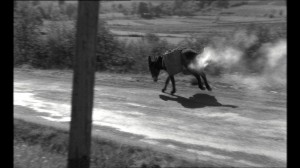 Unfortunately, it is this constant confusion that undermines the film as a whole. There is a lot of focus on the murder, and Gerard trying to place blame on Arnold. But we never learn who was murdered, or why. When the police come to tell him the news about his inheritance (which is a strange red herring, why would the police do that? It’s already been established in a previous scene that lawyers and accountants get involved in these matters), he points a gun at them and fires, but the explanation about why nothing happened to him, is done in voice-over as an afterthought and is edited in a rather hasty fashion, which makes it difficult to follow. The murder then somehow disappears from the story without any resolution. When Marie disappears at the end after being beaten by someone, we never learn who did it, or why, or if, when her mother tells her childhood lover Jacques that she’s gone, she means that she’s dead or she’s just run away. When Marie’s father dies, the cause is also a mystery. When the gunshots are fired in the field after Balthazar is stolen, causing Gerard and his crew to run away, we never learn where the gunshots come from. One could assume it was the man herding the sheep, but seeing as so much times passes before Balthazar dies surrounded by the flock, from the middle of the night to the morning, it seems unlikely that the shots would have been audible at all.
Unfortunately, it is this constant confusion that undermines the film as a whole. There is a lot of focus on the murder, and Gerard trying to place blame on Arnold. But we never learn who was murdered, or why. When the police come to tell him the news about his inheritance (which is a strange red herring, why would the police do that? It’s already been established in a previous scene that lawyers and accountants get involved in these matters), he points a gun at them and fires, but the explanation about why nothing happened to him, is done in voice-over as an afterthought and is edited in a rather hasty fashion, which makes it difficult to follow. The murder then somehow disappears from the story without any resolution. When Marie disappears at the end after being beaten by someone, we never learn who did it, or why, or if, when her mother tells her childhood lover Jacques that she’s gone, she means that she’s dead or she’s just run away. When Marie’s father dies, the cause is also a mystery. When the gunshots are fired in the field after Balthazar is stolen, causing Gerard and his crew to run away, we never learn where the gunshots come from. One could assume it was the man herding the sheep, but seeing as so much times passes before Balthazar dies surrounded by the flock, from the middle of the night to the morning, it seems unlikely that the shots would have been audible at all.
Was Bresson’s point solely that life is random and horrible, and there is nothing you can do to make sense of it? That seems to be the suggestion in a pointed scene where the priest says, over Marie’s father’s dying body “You will be greatly forgiven because of your suffering.” But is that a lesson worth imparting? The entire film drowns the viewer in this fractured feeling, jumping from time period to time period, never allowing us to connect to the people, making them suffer, though they refuse to fight back. When Arnold dies two weeks after receiving all the money, the message is that now that he has something to live for and he garners respect, he won’t know what to do with it. He had his niche as the town drunk, ridiculed by all, and his good luck has ruined everything.
The Chat
Adam With the constant dissolves, was Bresson covering up scenes that he cut? Trying to get to the next event. There was a lot of Malick in this movie. Like an unpretty Days of Heaven.
Richard I don’t know about what was filmed and excluded, but he does it in almost every of his films. He is strict about not allowing cut material to surface. When Criterion was to release Diary of a Country Priest, it was supposed to include a couple of cut scenes, but the estate had them pulled.
Rhett I took it as a way for him to distance the audience never allowing us to see enough of the story for us to get emotionally involved, allowing us to observe the life of Balthazar as if we were god.
Shawn I thought the acting accomplished that on its own.
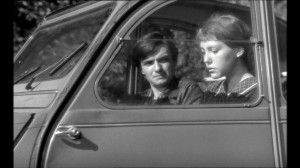 Adam That purposeful disconnect, does it work?
Adam That purposeful disconnect, does it work?
Richard Besides distance, I think it fits with the idea that is so common in horror movies- what we don’t see explicitly is often more powerfully imagined in our minds. And it allows for each viewer to make their own interpretations.
Adam I had a hard time following the story, which is obviously on purpose so many details left out which would make it less work to tie things together. And while I can see the purpose, while watching the film itself, it was a bit frustrating.
Rhett Initially, it is really distracting, and it makes the film tough to follow throughout. But at the end of the film, when the donkey was finally laid to rest, I felt as if Bresson had given me everything I had needed in order to judge Balthazar objectively
Richard I actually watched it twice (a month ago and yesterday) a lot of things made more sense the second time around.
Shawn Well it is obvious that we are supposed to be distanced from the human actors. Most filler scenes not involving Balthazar are removed or very short.
Adam But Rhett, since he’s basically just an object who is preyed upon. What did you judge him on? He is only faintly animate.
Richard Rhett, I noticed that a single shot often demonstrated what would take five minutes in a conventional film.
Rhett That he lived life submissively as a man of good faith should, and that he has deserved his rest. A noble savage.
Adam Yes, but why then, is there so much focus on the unimportant. The murders and the death, since it is about Balthazar and he changes hands so much he doesn’t get a chance to relate to his owners. What happens to them is irrelevant.
Rhett I viewed that as Bresson’s commentary on the state of our society, where we are driven by capitalistic, self-serving greed. So amidst all this vice, death and abuse, Balthazar emerges as the ultimate being. Accepting wholly of what his responsibilities on Earth are. Never complaining. Simply being.
Shawn Not just being, but being saint like.
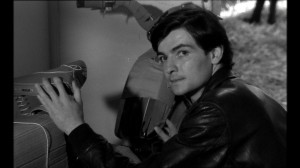 Richard Adam- I thought that it was meant to add to the constant atmosphere of chaos/lack of sympathetic characters/potential for harm to Balthazar.
Richard Adam- I thought that it was meant to add to the constant atmosphere of chaos/lack of sympathetic characters/potential for harm to Balthazar.
Adam Well it is made overt at the end that he is a martyr. But can God also be a martyr? Is he Jesus?
Shawn He certainly has “the patience of a saint.” And he really brings nothing negative to anyone.
Richard Speaking of that ‘never complaining’, how did you guys take some of the scenes where the humans acted incredibly passively? A prime example is early in the film with the boys beat him and Marie watched.
Adam She is all passivity. I thought the religious reference there was obvious. Her name isn’t Marie for nuthin’.
Shawn I thought to further show that the humans can’t be related to.
Rhett She sleeps in a manger. Along with Balthazar.
Adam She didn’t give birth to him, but is clearly his mother.
Rhett I think he is Jesus then, since Balthazar and Marie are always made out to be two cut from the same mold.
Shawn And then at the end, he dies surrounded by his “flock.” Jesus was a shepard after all.
Richard I saw those references, but was that an excuse to do nothing to protect him or herself? Was it just an effort to pair them- observers/sufferers?
Adam But if it is all analogy, what is the surface?
Shawn Well animals, especially domesticated ones, are essentially defenseless toward humans. Which is why I liked that, in the end, there are absolutely none with him.
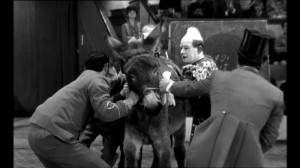 Richard Speaking of the ending, there is a single shot of a wound on his leg. The cause isn’t entirely clear nor is the severity. Was it the cause of his death or merely a red herring? I preferred the thought that he lived…. Long enough to find his flock/peace and simply faded away.
Richard Speaking of the ending, there is a single shot of a wound on his leg. The cause isn’t entirely clear nor is the severity. Was it the cause of his death or merely a red herring? I preferred the thought that he lived…. Long enough to find his flock/peace and simply faded away.
Shawn The wound on the leg was supposedly a gunshot wound.
Adam Yes, but from where?
Rhett There is a lot of ambiguity surrounding his death. It never reveals who is doing the shooting. nor why s/he would be shooting at him.
Shawn Someone off-screen was shooting at Gerard and his friend.
Richard There was shooting in the field as they ran.
Adam It’s certainly not the guy herding the sheep. We don’t even know why they stole him again. Or for what purpose. They must have been pretty bored.
Shawn Well they were being shot at for stealing.
Rhett Well, if he is Jesus, then maybe it was the gunshot of god? Balthazar is shot long after the guys have left though. So I would think that hitting him was deliberate.
Adam Yes, but they were a long ways away before the shots were fired and it was the middle of the night. And they were quiet. We can assume that no one from the house noticed. Especially since it’s only the grieving mom on the property.
Shawn Well it seems as if Gerard’s entire existence was to abuse the donkey.
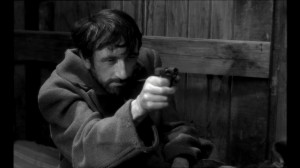 Richard What was the significance of the beast ending up with all of the earthly treasures?
Richard What was the significance of the beast ending up with all of the earthly treasures?
Rhett Judas?
Shawn “The meek shall inherit.”
Richard Aside from all of the symbolic meaning, why would the villagers put up with Gerard? Everyone seemed to know that he was trouble, but he had free reign over almost everything that he pleased.
Rhett Yeah, that was puzzling, and how Marie would fall for him over Jacques.
Shawn Not only that, he was rewarded by them too.
Adam That gets at their passivity. But more towards why the entire film is analogy. And there is no real surface. It reminded me of Naked Lunch in that way.
Richard In that nothing was ‘real’, and it was all allegorical?
Adam Yes, but also how the surface doesn’t really connect and is rather confusing, even on its own surreal terms.
Rhett Well, the basic story was so simplistic that you can’t help but just see everything as subtextual.
Adam That the allegory/metaphor/analogy is more important than the surface. And then the subtext becomes the text.
Richard Since we agree that was intentionally confusing, do you think that it was an effective technique? Would Balthazar have been so saintlike or even significant if we were allowed to focus on the murders and illicit dealings?
Adam No, I think it should have focused less on the murders. Don’t give me a snippet and tease us with bits of information, but not enough to either ignore it or understand it.
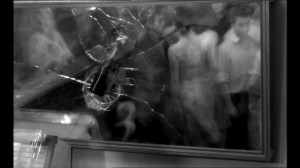 Rhett At first I was put off by it, but by the end the technique was effective. The murders could have been left out though.
Rhett At first I was put off by it, but by the end the technique was effective. The murders could have been left out though.
Adam That draws you into the story points, as opposed to the point Bresson seemed to be making about the oppressiveness and pointlessness of life.
Rhett But I liked the way we never really get to feel for Balthazar on an emotional level. Had Bresson resorted to cute shots of Balthazar in order to get our sympathy when he was being tortured, it would have become Air Bud.
Adam MAD: Most Allegorical Donkey
Richard I agree. The murders only seemed to intro us to the drunk. That could have been done in some other way.
Shawn That was one of the things that made me shy away from it at first.
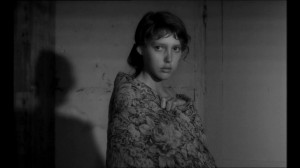
Richard The objectivity reminded me of Bunuel. Many of his characters do terrible things, but he never tells us who is good or bad. We figure it out for ourselves.
Adam We didn’t need to sympathize in an artificial way with Balthazar, but there seemed to be too many attempts to get us involved in the human action. When the point is, they don’t care about their own lives. So why should we?
Shawn I don’t know, I found none of the humans engaging at all.
Adam Noto, they weren’t, but we should see less of their lives then.
Rhett I’ve never seen an animal presented in the way that Balthazar was here
Richard I didn’t care about them (other than Balthazar), but I enjoy reveling in their suffering.
Adam But why did you care about Balthazar? He was just a thing.
Shawn The only character that was developed to any satisfaction was Gerard and he only existed as a plot device to continue Balthazar’s oppression.
Richard On a technical level, do you think that there was only so much that could be done with Balthazar? Calling for humans to fill in the time?
Shawn Balthazar was the only character that did not cause grief/pain to another.
Richard I can’t help but care about animals. It doesn’t matter what kind. It wouldn’t matter what Bresson did. I would care regardless. I’ve never been able to understand why. I’m almost the opposite with humans.
Rhett He seemed more than an animal to me, like I understood him from a more broad level, just a being on this Earth trying to survive.
Shawn That is why I liked him. In a world full of ridiculous humans, the ass is the one with the best outlook.
Rhett He wasn’t made cute or sentimental or anything. He wasn’t given some animate personality.
Richard Sentimentality would have killed it.
Shawn I found the scene where Gerard lit his tail on fire very difficult to watch.
Adam Especially because it was obviously not faked. But is that why we sympathize? Because we see him abused? If he had not been the martyr figure, how does he transcend his lack of personality?
Shawn I sympathize because there was no logical reason for it.
Richard I think that it gets back to Rhett’s point about him ‘just being’ and trying to survive.
Shawn The donkey never, say, shit on his shoe. To which you could understand (but not rationalize) his animosity towards him.
Adam But, Richard, did you feel for him before the tail/fire scene? Or is that what instigated it
Richard Yes. From the first moment. It was even before the baptism.
Adam Because he is a cute animal at that point?
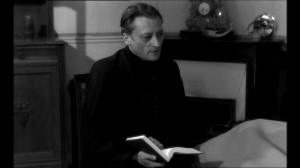 Richard Not cute, but because he was an animal. I can’t justify it. I’ve always felt that way about them.
Richard Not cute, but because he was an animal. I can’t justify it. I’ve always felt that way about them.
Adam What I’m trying to get at, is Bresson playing on our general sympathies for animals? I don’t think you’re alone Richard.
Rhett Yeah, I felt for the animal the moment it was born, if it wasn’t maltreated I think I would have felt the same way.
Adam Say it wasn’t a donkey. It was a tree. Or a plant.
Shawn If it were a tree would change the significance of the entire movie.
Richard I don’t think it would work as a plant, but for me, almost any animal could work.
Adam A plant can be moved from place to place, owner to owner, change size and shape, has emotions, has a purpose. Balthazar is barely a character. We get a few shots of him here and there, makes noises off-screen, but nothing else. Our sympathies are entirely related to his being an animal.
Rhett I think a plant would work almost the same way.
Shawn Right but a plant cant be say… used for wrongdoing. and it can’t react in a way that is visible enough for an audience to see.
Rhett If it was put in the shade, you’d see it trying to grow towards the light, you’d see it accepting people carving things into it, etc.
Adam Well, Shawn, clearly you’ve never seen Little Shop of Horrors.
Shawn Little Shop of Horrors was hardly an allegory to Christianity.
Adam So you say. Seymour = Jesus. Rather Rick Moranis is Jesus.
Shawn Audrey II is Satan?
Rhett I just think though, that regardless of whether it was an animal or a plant, Bresson is just saying that that is how we should live our life, submissive and non-questioning, for we shall be given ultimate happiness in the afterlife.
Shawn That shows tremendous faith. I can’t say I am convinced.
Adam So it’s a Buddhist film?
Rhett Or a Christian film.
Richard Bresson was a Catholic.
Rhett Jesus suffered in silence as Balthazar did.
Richard I think that the non-human lead was essential for that outlook. No human could tolerate as much w/o harming someone and capture our sympathies. Look how quickly we lost interest in the passive people and their bland lives.
Shawn Jesus suffered in silence for the purpose of “taking on the sins of our fathers” not because he lacked an opposable thumb.
Adam Arnold seemed acceptable.
Richard Do you think that he was holding Jesus/Balthazar out as the ideal? Not something that you have to emulate, but try to live as closely as possible?
Rhett I think in showing all these people doing villainous things, that we have to be like Balthazar and just have faith that if we live a good and unassuming life that we will be granted our way into heaven.
Adam But the murder thing was a big distraction in his life. There was all this strange stuff at his party.
Richard Was it ever clear that he was the real murderer or did the gang frame him?
Adam Like when everyone started throwing bottle at the mirrors, none of the people stopped dancing.
Richard In the party, I wasn’t sure why the lawyers would be handling the will in the bar.
Adam and the way the cops approach his house to let him know he is now rich. Why would the cops do that? There’s that confusing portion where it reveals that the gun is empty. Bresson makes pains to show that he gets his fingerprints on the gun, but for what? So he can fire an empty gun and the police don’t care?
Rhett To show maybe that he wouldn’t do as the good book says and turn the other cheek. Whereas Balthazar always turned the other cheek.
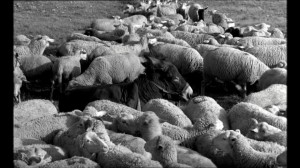 Adam Yes, but Rhett, Balthazar had no choice in that matter. Jesus made it clear he was doing that because it was the right thing to do. That’s kind of why I’m stuck on the animal thing.
Adam Yes, but Rhett, Balthazar had no choice in that matter. Jesus made it clear he was doing that because it was the right thing to do. That’s kind of why I’m stuck on the animal thing.
Rhett Balthazar could have done a lot more than he did, like he could have ran away when he was being shot at, or he could have bit at the people, tried to kick, retaliate, anything. But instead he just took the pain by turning the other cheek.
Shawn He is still just a donkey. At that point it is explained he is old and can’t do much, but still, his whole life he could have acted in some defense.
Rhett But he didn’t, that is the point. Balthazar definitely had choices.
Adam I think E.T. was a remake, except, instead of an ass, they made the movie with a penis.
Rhett And Mac and Me was made with a vagina.
Shawn I disagree, E.T. was stuck, and wanted to get the fuck out. He even empowered the kids to fly away from the pursuers. E.T. was God. Mac and Me was merchandising.
Rhett Alas, no Reese’s pieces in Au Hasard Balthazar.
Adam I thought I saw him sipping from a bucket of Zima? It’s what kept Balthazar so mellow throughout the beatings.
Shawn Wouldn’t you? If my tail was torched, I am going to get wasted.
Rhett The sale of oats and barly used in donkey trophs skyrocketed after Balthazar’s release.
Adam Did the flat level of the acting help or hurt the film? Because I saw it as neorealism, but really monotone and tired.
Richard I think it helps, distances us, keeps us from caring about the humans.
Shawn I think the flat acting is key to forcing sympathy to the beast.
Rhett By presenting everything objectively, I found myself much more actively involved in deciphering who these characters really are.
Adam But Rhett, since they were so passive and we don’t get enough clues as to their motivation, did that really matter?
Rhett Again, because Balthazar was such a blank character, I felt I had even more responsibility in determining what kind of character he really was. Like god deciding whether a person should go to heaven or hell.
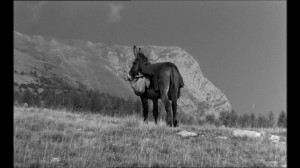 Richard How about the use of music? It was used sparingly and in key scenes, but I never felt that it was forcing me to feel one way or the other. It appears with greater frequency than any Bresson that I remember.
Richard How about the use of music? It was used sparingly and in key scenes, but I never felt that it was forcing me to feel one way or the other. It appears with greater frequency than any Bresson that I remember.
Rhett Yeah Richard, the music never really seemed to dictate emotions, it was always just kind of lurking in the background. Subdued and somber.
Adam But there was the opening credits, where the classical music is playing. And it is interrupted by Balthazar.
Rhett And that same music plays over the end.
Shawn Once Gerard got the radio, I associated it with him for the remainder of the film.
Richard Same here Noto. It made me feel guilty for enjoying his selections, since he was so loathsome.
Adam I thought it was supposed to be just generic French pop.
Shawn Well it was simply a radio, so he had little ability to make selections.
Richard But, I like the juxtaposition of upbeat songs and cruelty. I like French pop.
Adam I figure that Bresson, as a strict moralist would abhor that style of music.
Rhett But even with the music, you never got to spend time with a character for a long enough sequence to ever fully feel anything for them. The whole movie was alienating fragments to force objectivity.
Adam What about the circus scene? That was the ultimate in trying to make us sympathize with Balthazar. Showing him being exploited. Pretending he was some math genius.
RichardI liked that scene- especially the shots of the other animals. But that gets back to my tendency to sympathize with any animal.
Shawn Richard is a pussy towards animals.
Richard I won’t argue with that.
Shawn Go ahead, Rich. Bust out your PETA card. Tell us what level member you are.
Richard That raises another inconsistency. I’m always sympathetic for animals, but I love me some veal and foie gras.
Adam But does the circus scene go too far in making us try to sympathize with him? I was reminded of Freaks while watching it.
Richard He seemed to go out of his way to show the unique ones… elephant, tiger.
Rhett You still don’t really sympathize with Balthazar, since most of the shots are of his feet, hooves, whatever.
Adam But he’s being treated so badly in that scene and the crowd whoops it up when he sees Arnold, not understanding the significance.
Rhett I thought he was treated worse in the tail burning and bat beating scenes.
Adam Yes, but the way there was a spectacle made it different. Like the crowd thought he was an entertaining freak, not seeing how he was being tortured.
Rhett Or maybe that scene was showing his Jesus-like qualities, able to do miracles.
Shawn That is a take I certainly didn’t think about. Even among the other Jesusness.
Adam Bullshit, Jesus had an abacus. He couldn’t multiply like that
Rhett Jesus was a carpenter, Balthazar a mathematician. “we are all one in the circle of life.” – Mufasa
Richard Like Rhett, I didn’t find it as upsetting as the tail burning or the beatings. I guess it’s because the others revolved around physical pain. The audience was cruel, but I don’t think that their scorn hurt Balthazar.
Adam I think the circus scene is worse because we can see Balthazar’s emotional reaction to it.
Rhett Does anyone know if there is any deeper meaning to the name Balthazar?
Adam Balthazar = one who will star in some David Lynch films but fade from the cultural pantheon.
Rhett I found this: Balthazar (New Testament) one of the three sages from the east who came bearing gifts for the infant Jesus.
Richard That puts the end in a different light. He did bring gifts (stolen goods) to the lambs. But that doesn’t make sense allegorically.
Rhett Yeah, it definitely confuses the Jesus metaphor.
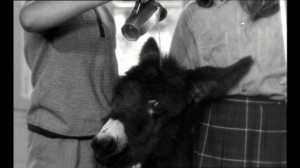 Shawn But what was Balthazar carrying? Perfume/incense.
Shawn But what was Balthazar carrying? Perfume/incense.
Richard Gold.
Rhett So then was his entire journey based around bringing gifts to his flock?
Richard Bringing gifts AND dying for their sins?
Shawn I don’t see Balthazar as dying for other’s sins.
Rhett Au Hasard means “randomly” in French.
Adam So Bresson just kind of cobbled together different religious elements, threw them into a stew, and said “Jesus du jour!”
Shawn Balthazar is Jewish I think.
Adam “I think?” I know. I saw his cock. Definitely cut.
Rhett Balthazar’s life was entirely random.
Shawn He was lazy, full of himself, and refused to defend himself. Gerard is obviously symbolic of Nazi Germany. And Marie was Anne Frank. Hiding away. The sheep were obviously symbolic of the U.S. arriving too late, per usual, in a von Trierish way.
Rhett But attempts are Marie throughout to compare her to Balthazar. She is forced to stay inside, and looking through the window is juxtaposed with Balthazar looking through the chained fence. And at another point someone tries to sell her, saying “if you want her, pay.” And of course she is mistreated and made to sleep in the barn.
Adam Do we know who beat her? There was that part where she was naked and beaten, but we never got a sense of who did it.
Shawn I just assumed it was Gerard.
Richard I assumed that it was Gerard’s gang too. That line about Marie stood out to me too. Had she slipped into prostitution it was just an aside?
Adam I think she was into prostitution. Remember the scene where she is all wet and stays at the owner’s house? And she offers to kiss him, then tells him he’s old and ugly, then he gives her money for pity and she hands it back eventually. But it’s implied that they sleep together.
Rhett So she basically denigrates herself to the status of an animal. Kind of a pathetic character.
Richard Do you think that she was forced into it by Gerard? It would be against character to choose to do anything.
Shawn I think she felt it was what she was supposed to do she just allowed herself to do it.
Rhett If she was forced into it that would make sense if we are comparing her to Balthazar. Just doing what you are told.
Shawn Rhett-all the characters were pathetic. She is not unique in that.
Rhett But most characters acted on their own will. She, like Balthazar, acted on the will of others.
Richard Could she have had so little self esteem that once she lost her innocence with Gerard she figured she may as well go with anyone? Not out of duty, but just for something to do?
Shawn That makes them no less pathetic though. So, this could have been a seriously cut-down version of the world’s first donkey porn. Adam did see a penis.
Rhett I think it is tough to say, Richard, Bresson left so much ambiguous.
Richard Maybe it was Balthazar who stripped her and locked her in the room? It had to be cut to keep his martyrdom intact.
Shawn It was a shame how Balthazar’s career went from Bresson films, to porn, to finally being cast in Shrek.
Richard Shrek was the ultimate insult.
Shawn Agreed, Balthazar was truly made to be an ass and a black man voiced him. There ain’t no black Jewish donkeys. It’s not just that he was black, but Balthazar was promised by the producers that it would have been Bernie Mac, who he was a big fan of. He LOVED him in Charlie’s Angels 2.
Richard One last question (relating to Rhett’s comment)… Would it have had the same power had it not been so ambiguous? If everything was clear…. this is Jesus…. this is Judas… etc.
Adam No, it needed the mystery. While I was not into the movie while actually watching it, the ambiguity made me think about it afterwards.
Rhett I don’t think we would have been able to talk about it near as much if it was more straightforward.




Au Hasard Balthazar – 1966 | SP Film Journal says:
July 7th, 2013
10:47 pm
[…] 2013. Au Hasard Balthazar | A Regrettable Moment of Sincerity. [online] Available at: http://regrettablesincerity.com/?p=1230 [Accessed: 8 Jul […]
Nick says:
December 26th, 2013
1:59 am
Marie was raped by the gang. They are seen running out of the building throwing her clothes. She subsequently died or killed herself; her mothers comments made this clear. Balthazar died from the gunshot wound. Shots were fired by Customs at Gerard and His friend. B reacted to just one; obviously the one that struck him. No offense but this was all quite obvious.